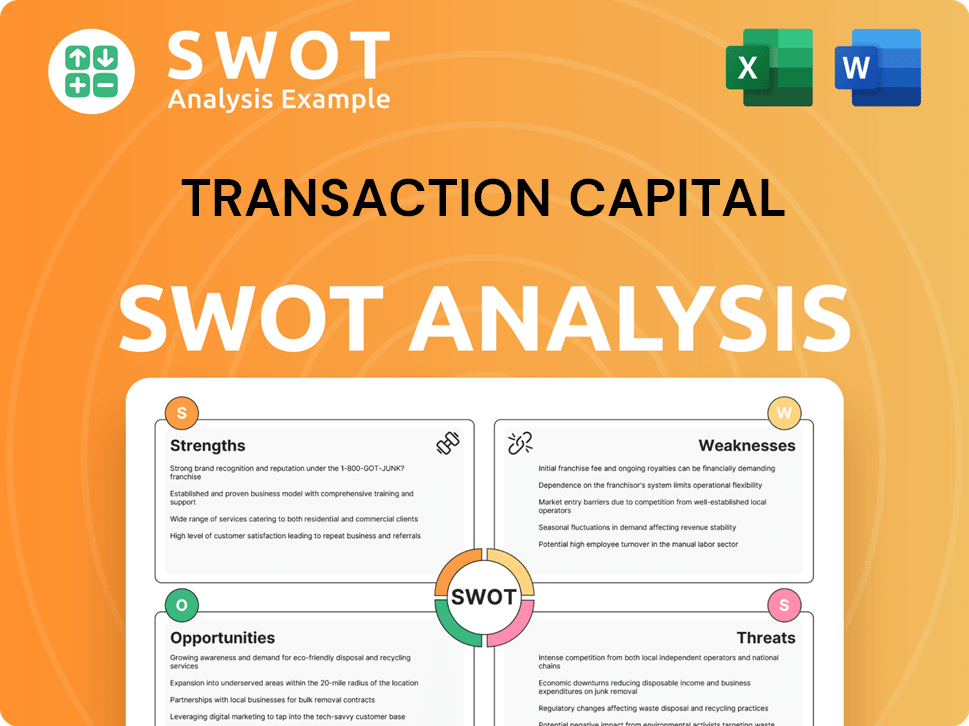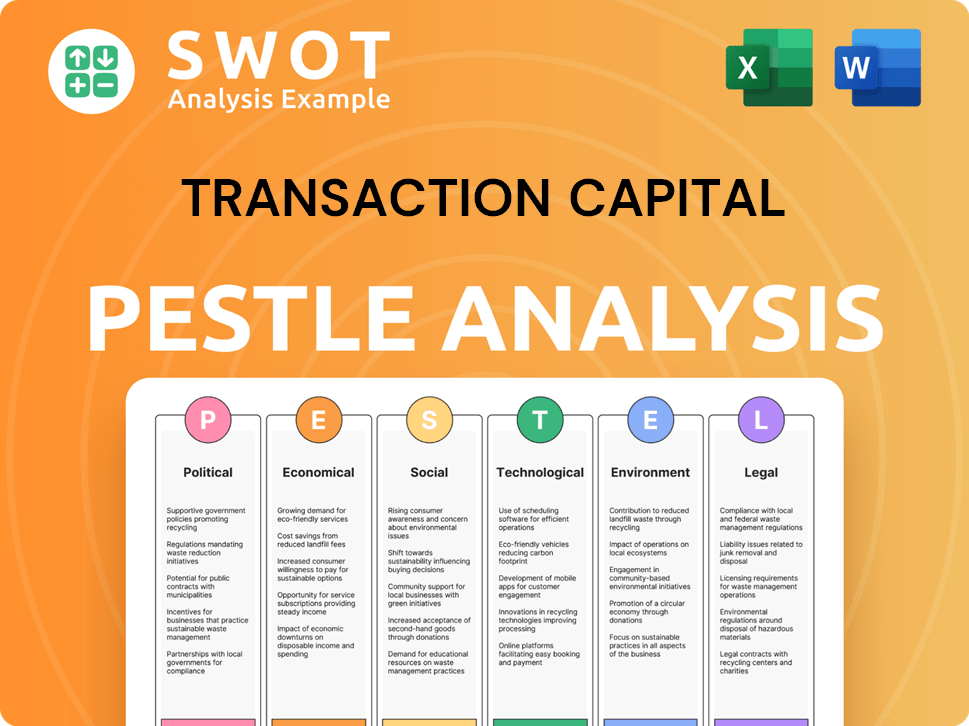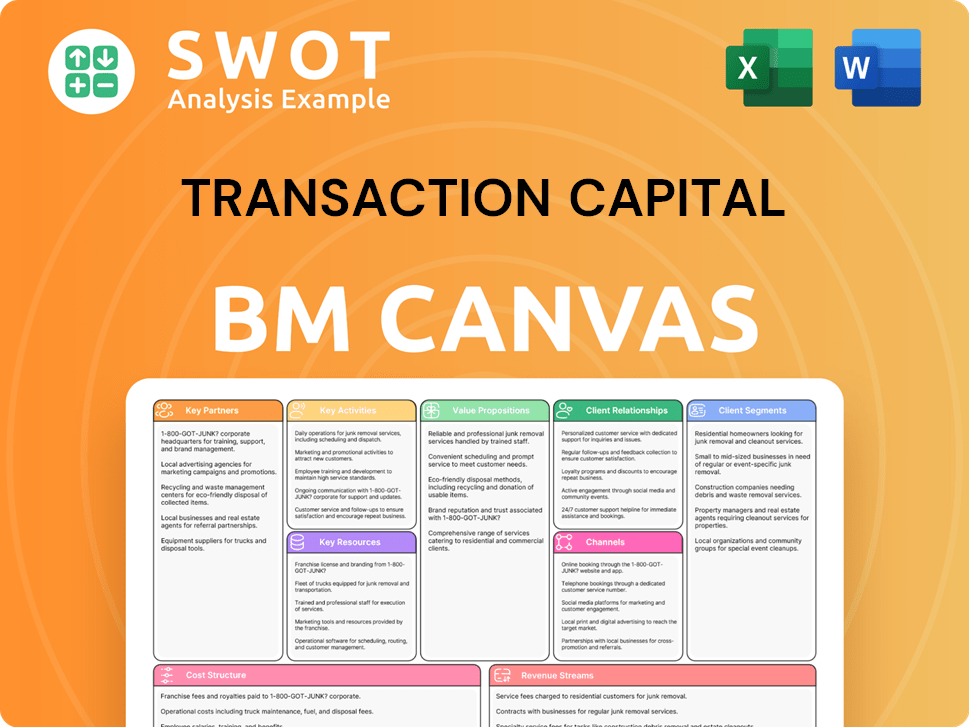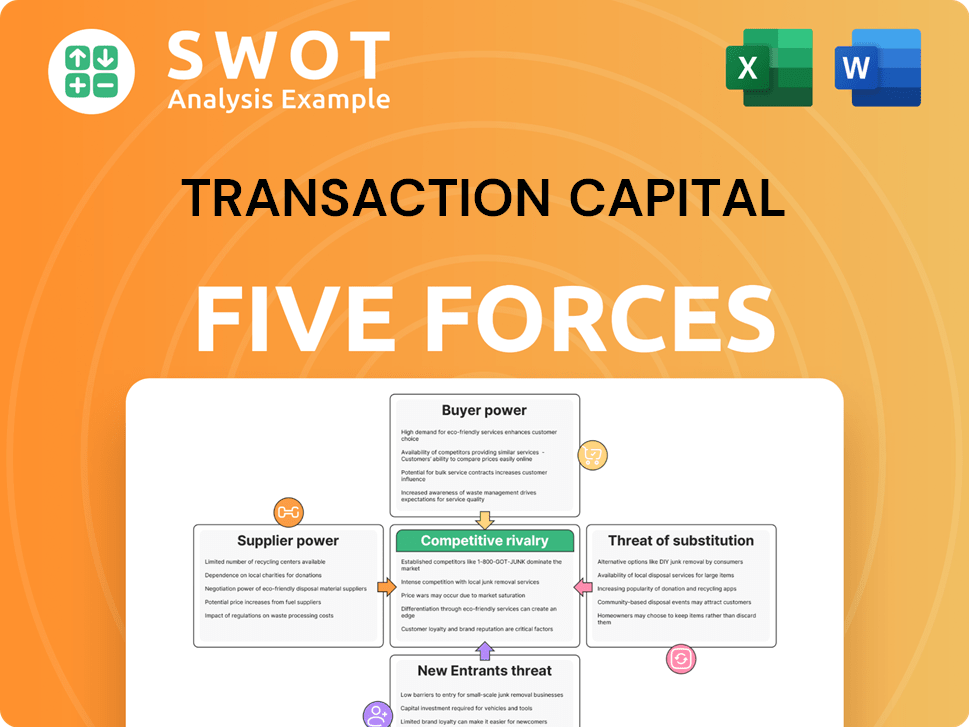Transaction Capital Bundle
What's Next for Transaction Capital?
Transaction Capital, a South African investment holding company, is undergoing a significant transformation. Having unbundled WeBuyCars in early 2024, returning billions to shareholders, the company is now strategically shifting its focus. This evolution sets the stage for an exciting exploration of its future.

Founded in 2007, Transaction Capital's Transaction Capital SWOT Analysis reveals a dynamic company profile, currently transitioning to become a global specialist Business Process Outsourcing (BPO) operator under the Nutun brand. This strategic shift impacts its Transaction Capital Business model and future outlook, presenting new opportunities for growth and expansion. Understanding Transaction Capital's growth strategy and its future prospects, including its investment strategy and financial performance, is crucial for investors and stakeholders alike, especially considering the company's recent acquisitions and long-term growth potential within the evolving industry trends.
How Is Transaction Capital Expanding Its Reach?
Transaction Capital's Marketing Strategy of Transaction Capital is currently undergoing significant transformation, primarily focused on strategic repositioning and streamlining operations. The company is actively pursuing expansion initiatives centered around its core business, Nutun, aiming to establish it as a global specialist in Business Process Outsourcing (BPO).
This strategic shift involves a series of divestments and realignments designed to create a more focused business model, diversify revenue streams, and enhance financial stability. These actions are critical for Transaction Capital's future growth and long-term value creation. The company's approach reflects a proactive strategy to adapt to evolving market dynamics and capitalize on emerging opportunities.
The primary goal of these initiatives is to strengthen Transaction Capital's financial position and improve its ability to compete effectively in the market. This includes optimizing its portfolio, reducing debt, and focusing on high-growth areas such as BPO and credit services. The company's expansion plans are designed to drive sustainable growth and deliver value to shareholders.
Transaction Capital has been actively divesting non-core assets to streamline its operations and focus on its strategic priorities. The sale of Nutun Australia for R624 million and the planned sale of Nutun Transact for R405 million are key steps in this process. These moves aim to strengthen Nutun's balance sheet and improve its liquidity.
Nutun's strategy centers on its core businesses, including collection and debt acquisition services in South Africa and international BPO operations. The company is looking to increase its activity in acquiring unsecured Non-Performing Loan (NPL) portfolios. This strategic focus leverages Nutun's extensive experience in the South African market.
Transaction Capital disposed of a controlling interest in Mobalyz to its management consortium. However, the company retained a minority equity interest of 26.6%. This transaction allows Mobalyz to operate independently while Transaction Capital maintains a stake in its success. This is part of the company's broader strategy to optimize its portfolio.
The unbundling of WeBuyCars and the streamlining of other non-core assets are critical milestones in Transaction Capital's strategic realignment. These actions enable Nutun to concentrate on its specialized BPO and credit services. This strategic focus is designed to drive efficiency and improve profitability.
Transaction Capital's expansion initiatives are designed to create a more agile and profitable business. These initiatives are crucial for the company's long-term growth potential. By focusing on core competencies and streamlining operations, Transaction Capital aims to enhance shareholder value.
- Strategic Repositioning of Nutun: Transforming Nutun into a global BPO specialist.
- Divestment of Non-Core Assets: Selling Nutun Australia and Nutun Transact.
- Focus on NPL Acquisition: Increasing activity in acquiring unsecured Non-Performing Loan portfolios.
- Investment in BPO Growth: Capitalizing on growth opportunities in the BPO sector.
Transaction Capital SWOT Analysis
- Complete SWOT Breakdown
- Fully Customizable
- Editable in Excel & Word
- Professional Formatting
- Investor-Ready Format

How Does Transaction Capital Invest in Innovation?
Transaction Capital is actively leveraging technology and innovation, primarily through its Nutun business, to fuel its growth strategy, particularly within the Business Process Outsourcing (BPO) and credit services sectors. The company's focus on digital transformation is evident in its efforts to accelerate the digitization of financial processes, which drives demand for better connectivity, seamless integrations, and smarter tools.
The transaction banking landscape is experiencing rapid innovation, with a strong emphasis on advanced technologies, especially artificial intelligence (AI). This trend is shaping the company's approach to enhancing efficiency, improving data analytics for better decision-making, and offering more sophisticated solutions to clients. The integration of AI, IoT, and digital solutions is crucial for meeting evolving client needs and adapting to regulatory changes.
While specific details on R&D investments or key patents are not explicitly provided, the industry direction points towards a significant focus on AI, IoT, and digital solutions. New products, platforms, and technical capabilities in the BPO and debt collection space are expected to contribute to growth objectives. This strategic approach is vital for Transaction Capital's future outlook and long-term growth potential.
AI-driven applications are becoming increasingly prevalent in the transaction banking sector, with analytics and forecasting being key areas of innovation. Automation is heavily relied upon to streamline operations and combat fraud. The focus is on leveraging these technologies to enhance efficiency and improve decision-making processes.
Transaction Capital is accelerating the digitization of financial processes to meet the growing demand for better connectivity, seamless integrations, and smarter tools. This involves upgrading existing systems and integrating new technologies to enhance service delivery. This strategy is critical for maintaining a competitive edge.
The company is concentrating its technology and innovation efforts within the BPO and credit services sectors. This targeted approach allows for specialized solutions and better alignment with client needs. New platforms and technical capabilities are expected to drive growth within these key areas.
The industry trend indicates a strong focus on AI, IoT, and digital solutions to meet evolving client needs and adapt to regulatory milestones. These technologies are essential for staying competitive and addressing the changing demands of the financial services market. This includes anticipating and responding to market shifts.
The company aims to enhance efficiency and improve data analytics for better decision-making through its technological investments. This includes using data to optimize processes and provide clients with more sophisticated solutions. Better data analytics leads to more informed strategic planning.
New products, platforms, and technical capabilities in the BPO and debt collection space are expected to contribute to growth objectives. These innovations are designed to enhance efficiency, improve data analytics, and offer more sophisticated solutions to clients. This is a key part of Transaction Capital's expansion plans.
Transaction Capital's innovation strategy centers around several key areas designed to drive growth and improve operational efficiency. The company is investing in digital solutions to streamline processes and enhance client offerings. These investments support the company's overall financial performance.
- AI and Machine Learning: Implementing AI-driven solutions for analytics, forecasting, and fraud detection to improve decision-making and operational efficiency.
- Automation: Automating key processes within the BPO and credit services sectors to reduce costs and improve speed.
- Data Analytics: Leveraging advanced data analytics to gain insights, improve client service, and optimize internal processes.
- Digital Platforms: Developing new platforms and enhancing existing ones to provide more sophisticated and integrated solutions to clients.
- Connectivity and Integration: Improving connectivity and seamless integration to support the digitization of financial processes.
Transaction Capital PESTLE Analysis
- Covers All 6 PESTLE Categories
- No Research Needed – Save Hours of Work
- Built by Experts, Trusted by Consultants
- Instant Download, Ready to Use
- 100% Editable, Fully Customizable

What Is Transaction Capital’s Growth Forecast?
The financial outlook for Transaction Capital reflects a period of strategic restructuring and a focused transition towards its Business Process Outsourcing (BPO) business, Nutun. This shift is a key component of its growth strategy, aiming to streamline operations and capitalize on core business strengths.
For the fiscal year ending September 30, 2024, Transaction Capital reported a net loss of ZAR 985 million, an improvement compared to the ZAR 1,878 million net loss in the previous year. Despite the net loss, the company demonstrated resilience and progress in its restructuring efforts. The basic loss per share from continuing operations was ZAR 0.187.
The company's core loss from total operations increased to R2.0 billion in 2024, up from R728 million in 2023, with a total comprehensive loss of R1.632 billion for the year. However, group revenue for 2024 increased by 7% to R1.476 billion from R1.377 billion in 2023, indicating positive momentum in certain areas.
For the half-year ended March 31, 2025, Nutun's basic loss from total operations was R64 million. This shows ongoing efforts to stabilize and improve financial outcomes. The company is working towards sustainable profitability.
Transaction Capital has secured commitments from its primary bank funders to maintain all funding lines maturing before September 30, 2027, extending them to that date or beyond. This provides a stable financial foundation for its future endeavors. This signifies improved liquidity.
The company has suspended cash dividends until the restructuring is complete. This decision allows the company to allocate resources towards strategic initiatives and debt reduction. This is a common practice during periods of significant financial transition.
The successful unbundling of WeBuyCars in early 2024 generated R5.2 billion for shareholders and raised R1.0 billion through placement. This significantly reduced holding company net debt and contingent liabilities. This strategic move transitioned the company to a net cash position at the holding company level.
This financial re-engineering supports Nutun's strategic plans for increasing activity in acquiring unsecured non-performing loan (NPL) portfolios. It also supports investments in BPO growth opportunities. These investments are central to the company's
The company's focus on Nutun and strategic financial management positions it for future growth. The extension of funding lines and the net cash position at the holding company level provide a solid foundation for executing its strategic plans. This indicates a positive
Transaction Capital Business Model Canvas
- Complete 9-Block Business Model Canvas
- Effortlessly Communicate Your Business Strategy
- Investor-Ready BMC Format
- 100% Editable and Customizable
- Clear and Structured Layout

What Risks Could Slow Transaction Capital’s Growth?
The path forward for Transaction Capital, particularly with its transition to Nutun, is fraught with potential pitfalls. Several strategic and operational risks could impede its growth ambitions. Understanding these challenges is crucial for assessing the long-term viability of the company.
Market competition, regulatory changes, and technological disruptions pose significant threats. Internal resource constraints and recent financial performance further complicate the landscape. Addressing these risks requires proactive management and strategic adjustments to ensure sustained growth.
The company's ability to navigate these obstacles will determine its future success. Diversification, balance sheet strengthening, and strategic asset disposals are key components of its risk management framework. The streamlining of the board and executive roles is also critical in this process.
Intense competition in the BPO and credit services sectors presents a continuous challenge. New market entrants and evolving client demands require constant adaptation. The Transaction Capital must innovate to maintain its market position and attract new clients.
Changes in regulations, especially in financial services and data management, can significantly impact operations. Compliance costs may rise, requiring adjustments to business practices. Transaction Capital must stay ahead of these changes to avoid penalties and maintain compliance.
Businesses increasingly rely on interconnected systems and third-party software, creating supply chain vulnerabilities. Cyber threats are on the rise, with the number of published vulnerabilities increasing. The company needs robust cybersecurity measures to protect its systems and data.
Rapid advancements in AI present both opportunities and risks. While AI can drive innovation, it also creates new avenues for cybercriminals. The company must leverage AI while mitigating the associated risks. This is crucial for Transaction Capital's future outlook.
Internal resource constraints, including human capital and technology integration, can hinder growth. The successful implementation of growth strategies depends on effective resource management. Efficient allocation of resources is essential for Transaction Capital's expansion plans.
Recent financial performance, including a core loss from total operations in 2024, reflects the challenges faced during the transition. The company needs to improve its financial results to ensure investor confidence. Strengthening the balance sheet is a key part of the Transaction Capital strategic planning.
To mitigate these risks, Transaction Capital is focusing on diversification and balance sheet strengthening. Strategic disposals of non-core assets are also part of its strategy. These actions aim to create a more resilient business model.
Streamlining the board and executive roles is a key step in improving efficiency. The company is also focusing on its core businesses to optimize performance. These changes are designed to ensure future stability and growth.
For further insights into the company's core values and mission, consider exploring Mission, Vision & Core Values of Transaction Capital.
Transaction Capital Porter's Five Forces Analysis
- Covers All 5 Competitive Forces in Detail
- Structured for Consultants, Students, and Founders
- 100% Editable in Microsoft Word & Excel
- Instant Digital Download – Use Immediately
- Compatible with Mac & PC – Fully Unlocked

Related Blogs
- What are Mission Vision & Core Values of Transaction Capital Company?
- What is Competitive Landscape of Transaction Capital Company?
- How Does Transaction Capital Company Work?
- What is Sales and Marketing Strategy of Transaction Capital Company?
- What is Brief History of Transaction Capital Company?
- Who Owns Transaction Capital Company?
- What is Customer Demographics and Target Market of Transaction Capital Company?
Disclaimer
All information, articles, and product details provided on this website are for general informational and educational purposes only. We do not claim any ownership over, nor do we intend to infringe upon, any trademarks, copyrights, logos, brand names, or other intellectual property mentioned or depicted on this site. Such intellectual property remains the property of its respective owners, and any references here are made solely for identification or informational purposes, without implying any affiliation, endorsement, or partnership.
We make no representations or warranties, express or implied, regarding the accuracy, completeness, or suitability of any content or products presented. Nothing on this website should be construed as legal, tax, investment, financial, medical, or other professional advice. In addition, no part of this site—including articles or product references—constitutes a solicitation, recommendation, endorsement, advertisement, or offer to buy or sell any securities, franchises, or other financial instruments, particularly in jurisdictions where such activity would be unlawful.
All content is of a general nature and may not address the specific circumstances of any individual or entity. It is not a substitute for professional advice or services. Any actions you take based on the information provided here are strictly at your own risk. You accept full responsibility for any decisions or outcomes arising from your use of this website and agree to release us from any liability in connection with your use of, or reliance upon, the content or products found herein.